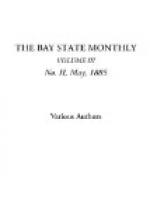Title: The Bay State Monthly, Volume 3, No. 3
Author: Various
Release Date: February 9, 2006 [EBook #17723]
Language: English
Character set encoding: ASCII
*** Start of this project gutenberg EBOOK the Bay state monthly ***
Produced by Joshua Hutchinson, David Garcia and the Online Distributed Proofreading Team at http://www.pgdp.net (This file was produced from images generously made available by Cornell University Digital Collections)
[Illustration: John Albion Andrew]
THE BAY STATE MONTHLY.
A Massachusetts Magazine.
Vol. III. August, 1885. No. III.
* * * * *
JOHN ALBION ANDREW.
The “War-Governor” Of Massachusetts.
John Albion Andrew, the twenty-first Governor of Massachusetts, was born, May 31, 1818, at Windham, a small town near Portland, Maine. His father was Jonathan Andrew, who had established himself in Windham as a small trader; his mother was Nancy Green Pierce, of New Hampshire, who was a teacher in the celebrated academy at Fryeburg, where Daniel Webster was once employed in the same capacity.
Jonathan is described as having been “a quiet, reticent man, of much intelligence and a keen perception of the ludicrous,” while his wife was “well educated, with great sweetness of temper, and altogether highly prepossessing in appearance.” There never was a more united and happy family. The father possessed ample means for their education, and left his household to the good management of his wife, who was admirable in her domestic arrangements, judicious, sensible, energetic, and a rigid disciplinarian of her children. There was a rare union of gentleness and force in this woman, which made her generally attractive, and especially endeared her to all who came under the influence of her character.
Mrs. Andrew died on the 7th of March, 1832. Shortly afterwards the husband sold out his property in Windham and removed to a farm in Boxford, in the county where he was born. He died in September, 1849.
John Albion, the oldest son, entered Bowdoin College in 1833, where he pursued a course in no way remarkable. He was a studious youth, applied himself closely to his books, and appeared to take no lively interest in athletic sports. Notwithstanding his studiousness, he was ranked among the lowest of his class, and was allotted no part at Commencement. Among his fellows he was, however, exceedingly popular, and his happy temperament, his genial nature, won him friendship which after years only made stronger and more enduring.
After his graduation the young man came to Boston and entered the office of the late Henry H. Fuller, as a student of law. The attraction between him and young Andrew was mutual, and they became almost like brothers. It was while serving his novitiate under Mr. Fuller that Andrew became interested in many of the reform movements of the day, and was as firm and peculiar in one direction as his friend was in another.




